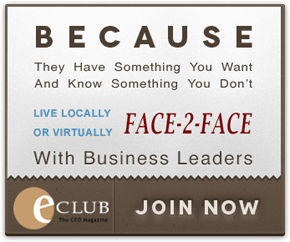You are here
- Chris Bijou |
- Self Governance |
- Wed, 05/08/2013 - 22:53

Why is it so embarrassing to admit we need help?
Don’t we all need help every day of some kind?
We ask an executive assistant for help calling someone back…or setting an appointment.
We ask someone to make us lunch at Arby’s.
We ask the pilot to fly the plane and flight attendant for a drink.
We ask the dog to stop barking, the kids to play nicely and our projector to connect quickly to get the presentation started.
(*Side note: It’s funny we recognize this every day without realizing it. Those who walk around TELLING the world verses ASKING are known as: JERKS. Other words also apply. We need less Jerks.)
So, why is it, our first reaction is often to hide, when I find most people are more than willing (and actually feel valued) when asked.
Asking builds loyalty
Actually one of the most powerful loyalty builders is to ask for help. Try it next time you are trying to get through a gate keeper. Just use the phrase, “Could I get your help for a minute…” If you sincerely mean it, it works more often than not.
Inefficiency at its best
One of my sales VP’s and I were working a conference. A mature gentleman came up to the registration desk at the Marriott with a huge cart full of boxes. One was actually a typewriter. Out of curiosity our VP asked about the load.
The man: “This is my mobile email transcriber.”
VP: “Oh, so what does that mean?” He replied, trying to hold back a laugh.
The man: “Well, I travel every night and I load this in my car. My wife gets my emails from the office during the day. She re-types them up on the typewriter. Then she faxes them to me. I type a response and then fax them back. She types them back into the email so my company can get their reports.”
Seriously? How can we help this guy?
Gibberish
One of my other managers went to help out a company improve performance. He gave an assignment. Part was written and part was oral. One gentleman stood up in front of the group to give his answer. He held a printed paper but struggled to say anything meaningful. This man had been the lowest performer in the group for years, often going long lengths of time without closing anything. His deals were also sold incorrectly; he had huge customer issues and was costing the company 2 or 3x what they were paying him. What finally came out was that he didn’t know how to read or write. The paper was nearly gibberish. He hid in their system and went from company after company for 25 years. He always found someone to write for him by pretending he didn’t have time. How is that possible? Where’s the management? Where were his peers?
Text to Speech issues will get you fired
You know another group that consistently needs massive help today? It’s the 20 to 30 year olds. I’ve interviewed so many that can’t speak. Seriously, they can’t communicate. They hold a thought for a few sentences. Then when asked to explain further, it’s so choppy, so disconnected. They are speaking like they text. The communication flow is agonizing in many of these ultra-intelligent young people. This is a mental life skill practice that needs help now. It’s becoming epidemic in service, sales, contact centers and the typical internal meeting.
(*Side note: One thing I truly appreciate about many of the Gen Yers is that they will ask for help once they recognize the problem. They just aren’t getting any or don’t know where to turn.)
Want to go beyond the stress of hiding in your career? Build trust as you ask for help often so you don’t have a nuclear event that destroys you. People are almost never fired for asking for help. They are often fired when they are found out because they didn’t.
Comments
Follow The Blog
Blog Categories
- Business Ops. (45)
- Editors (3)
- Entrepreneurship (196)
- Finance (25)
- Leadership (529)
Blog Authors
- Guest Blogger (835)
- Cynthia Kay (92)
- Linda Henman (78)
- Dianna Booher (46)
- Craig Ross (31)















